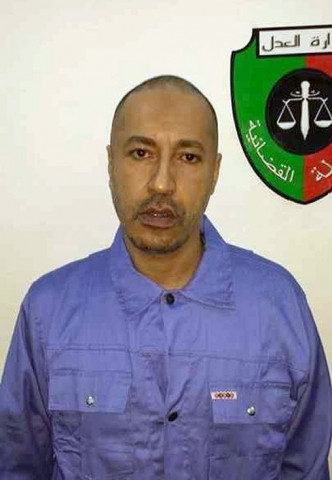Niger hands over Gaddafi’s playboy son to Libya
The Tripoli Revolutionaries Brigade release photographs on Facebook of Saadi getting his head and beard shaved.

A photo released by the Libyan Prison Authority on March 6, 2014, shows Saadi Gaddafi, after having his head and beard shaved following his extradition from Niger to Tripoli. PHOTO: AFP
The government said Saadi Gaddafi, who escaped to Niger during the revolt that saw rebels capture and kill his father, was now in Libyan custody.
The Tripoli Revolutionaries Brigade, a militia made up of former rebels, released five photographs on Facebook of a disconsolate-looking Saadi wearing a blue jumpsuit getting his head and beard shaved.
The 40-year-old was pictured kneeling on the floor as his hair was removed by a man wielding an electic razor.
Libya's government said he would be held in accordance with "international standards regarding the treatment of prisoners".
A spokesman for the attorney general said Saadi faces several charges, including "crimes to keep his father in power".
Seddik al-Sour told AFP the charges include involvement in the 2005 murder of a former coach of Tripoli football club Al Ittihad.
He is also accused of "seizing goods by force and intimidation when he headed the Libyan Football Federation".
Saadi Gaddafi was best known as the head of Libya's football federation and a player who paid his way into Italy's top division.
When he was 20, he trained with Italian clubs Juventus and Lazio.
He was a shareholder in Juventus, and also tried to buy Lazio in 2002 after the collapse of the Cirio food empire, which owned the club.
Despite not playing at the level required for Italian first class football, he was recruited by Perugia in 2003 for marketing reasons.
But he had barely kicked a ball when he was suspended after testing positive for nandrolone, an anabolic steroid.
The playboy footballer, born in May 1973, had been off the radar since fleeing in a convoy to Niger across Libya's southern desert in September 2011.
After hanging up his football boots, Saadi had forged a military career, heading an elite unit.
Despite initial setbacks suffered by his father's forces in the uprising, Saadi vowed that any territory lost would be regained "sooner or later".
Interpol had issued a "Red Notice" for Saadi, for "allegedly misappropriating properties through force and armed intimidation when he headed the Libyan Football Federation".
Libya had repeatedly called for Saadi's extradition from Niger, which had granted him asylum on "humanitarian" grounds, saying it had insufficient guarantees Libya's new rulers would give him a fair trial.
Saadi is subject to UN sanctions, including a travel ban and assets freeze.
Three of Gaddafi's sons were killed in the 2011 uprising, including Mutassim, who was killed by rebels in Sirte on the same day as his father.
Their bodies were later put on public display in Misrata, on the coast between Tripoli and Sirte, before being buried at a secret location in the desert.
Another son, Seif al-Arab, was killed in a NATO air raid in April 2011, just months before his brother Khamis died in combat in August at the height of the revolt.
Several key members of the Gaddafi clan survived, however, including the dictator's erstwhile heir apparent Seif al-Islam, who is wanted by the International Criminal Court but detained by a militia at Zintan in western Libya.
Former Libyan Olympic Committee chief Muhammad and Hannibal, who made headlines during scandal-packed European holidays, are believed still to be in Algeria, as is the fallen tyrant's widow Safiya and daughter Aisha.
Around 30 senior regime officials are believed to have entered Niger at the same time as Saadi, but the authorities in Niamey have not said how many remain in the country.
More than two and a half years after Gaddafi's downfall, Libya's transitional authorities have struggled to integrate former rebels into the police force and army.
Security forces are regularly attacked, especially in the east, and the presence of rival ex-rebel groups, heavily armed with weapons looted from Gaddafi's arsenals, could yet push Libya into civil war.












1724319076-0/Untitled-design-(5)1724319076-0-208x130.webp)






COMMENTS
Comments are moderated and generally will be posted if they are on-topic and not abusive.
For more information, please see our Comments FAQ